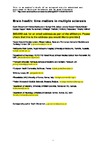Brain health: time matters in multiple sclerosis
| dc.contributor.author | Giovannoni, G | |
| dc.contributor.author | Butzkueven, H | |
| dc.contributor.author | Dhib-Jalbut, S | |
| dc.contributor.author | Hobart, J | |
| dc.contributor.author | Kobelt, G | |
| dc.contributor.author | Pepper, G | |
| dc.contributor.author | Sormani, MP | |
| dc.contributor.author | Thalheim, C | |
| dc.contributor.author | Traboulsee, A | |
| dc.contributor.author | Vollmer, T | |
| dc.date.accessioned | 2016-10-03T13:41:27Z | |
| dc.date.available | 2016-10-03T13:41:27Z | |
| dc.date.issued | 2016-09 | |
| dc.identifier.issn | 2211-0348 | |
| dc.identifier.issn | 2211-0356 | |
| dc.identifier.other | S1 | |
| dc.identifier.uri | http://hdl.handle.net/10026.1/5548 | |
| dc.description | publisher: Elsevier articletitle: Brain health: time matters in multiple sclerosis journaltitle: Multiple Sclerosis and Related Disorders articlelink: http://dx.doi.org/10.1016/j.msard.2016.07.003 content_type: article copyright: © 2016 Oxford PharmaGenesis Ltd. Published by Elsevier B.V. | |
| dc.description.abstract |
INTRODUCTION: We present international consensus recommendations for improving diagnosis, management and treatment access in multiple sclerosis (MS). Our vision is that these will be used widely among those committed to creating a better future for people with MS and their families. METHODS: Structured discussions and literature searches conducted in 2015 examined the personal and economic impact of MS, current practice in diagnosis, treatment and management, definitions of disease activity and barriers to accessing disease-modifying therapies (DMTs). RESULTS: Delays often occur before a person with symptoms suggestive of MS sees a neurologist. Campaigns to raise awareness of MS are needed, as are initiatives to improve access to MS healthcare professionals and services. We recommend a clear treatment goal: to maximize neurological reserve, cognitive function and physical function by reducing disease activity. Treatment should start early, with DMT and lifestyle measures. All parameters that predict relapses and disability progression should be included in the definition of disease activity and monitored regularly when practical. On suboptimal control of disease activity, switching to a DMT with a different mechanism of action should be considered. A shared decision-making process that embodies dialogue and considers all appropriate DMTs should be implemented. Monitoring data should be recorded formally in registries to generate real-world evidence. In many jurisdictions, access to DMTs is limited. To improve treatment access the relevant bodies should consider all costs to all parties when conducting economic evaluations and encourage the continuing investigation, development and use of cost-effective therapeutic strategies and alternative financing models. CONCLUSIONS: The consensus findings of an international author group recommend a therapeutic strategy based on proactive monitoring and shared decision-making in MS. Early diagnosis and improved treatment access are also key components. | |
| dc.format.extent | S5-S48 | |
| dc.format.medium | Print-Electronic | |
| dc.language | en | |
| dc.language.iso | en | |
| dc.publisher | Elsevier BV | |
| dc.subject | Multiple sclerosis | |
| dc.subject | Consensus statement | |
| dc.subject | Treatment strategy | |
| dc.subject | Disease activity | |
| dc.subject | Disease-modifying therapy (DMT) | |
| dc.subject | Magnetic resonance imaging (MRI) | |
| dc.title | Brain health: time matters in multiple sclerosis | |
| dc.type | journal-article | |
| dc.type | Journal Article | |
| dc.type | Review | |
| plymouth.author-url | https://www.webofscience.com/api/gateway?GWVersion=2&SrcApp=PARTNER_APP&SrcAuth=LinksAMR&KeyUT=WOS:000385323600002&DestLinkType=FullRecord&DestApp=ALL_WOS&UsrCustomerID=11bb513d99f797142bcfeffcc58ea008 | |
| plymouth.volume | 9 | |
| plymouth.publication-status | Published | |
| plymouth.journal | Multiple Sclerosis and Related Disorders | |
| dc.identifier.doi | 10.1016/j.msard.2016.07.003 | |
| plymouth.organisational-group | /Plymouth | |
| plymouth.organisational-group | /Plymouth/Faculty of Health | |
| plymouth.organisational-group | /Plymouth/Faculty of Health/Peninsula Medical School | |
| plymouth.organisational-group | /Plymouth/REF 2021 Researchers by UoA | |
| plymouth.organisational-group | /Plymouth/REF 2021 Researchers by UoA/UoA03 Allied Health Professions, Dentistry, Nursing and Pharmacy | |
| plymouth.organisational-group | /Plymouth/Research Groups | |
| plymouth.organisational-group | /Plymouth/Research Groups/Institute of Translational and Stratified Medicine (ITSMED) | |
| plymouth.organisational-group | /Plymouth/Research Groups/Institute of Translational and Stratified Medicine (ITSMED)/CCT&PS | |
| plymouth.organisational-group | /Plymouth/Users by role | |
| plymouth.organisational-group | /Plymouth/Users by role/Academics | |
| dc.publisher.place | Netherlands | |
| dcterms.dateAccepted | 2016-07-01 | |
| dc.rights.embargodate | 2017-09-01 | |
| dc.identifier.eissn | 2211-0356 | |
| dc.rights.embargoperiod | 12 months | |
| rioxxterms.versionofrecord | 10.1016/j.msard.2016.07.003 | |
| rioxxterms.licenseref.uri | http://www.rioxx.net/licenses/under-embargo-all-rights-reserved | |
| rioxxterms.licenseref.startdate | 2016-09 | |
| rioxxterms.type | Journal Article/Review | |
| plymouth.oa-location | http://www.sciencedirect.com/science/article/pii/S221103481630102X?via=ihub |


